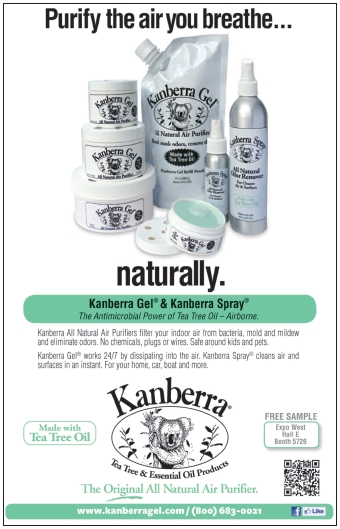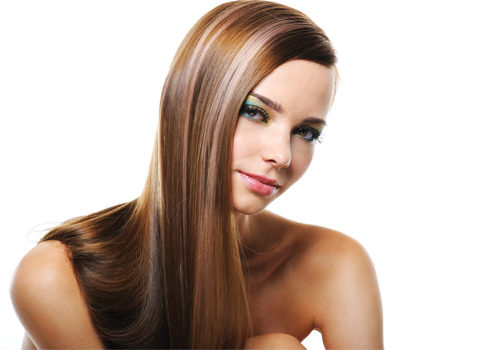Whether your customers come in with Shirley Temple curls, a slicked-back pompadour or a multicolored mohawk, how their hair looks and feels says a lot about who they are. When it comes to hair loss, thinning and damage, both men and women depend on all-natural ingredients to put the personality and life back into their hair.
Deter Dandruff
Dandruff is a chronic scalp condition that affects 50% of the population and is known to be caused by the yeast, Pityrosporum (1). Although the white flakes may be non-threatening, it can negatively affect one’s self-esteem and body image (2). There are many natural ingredients that can help those with dandruff.
Tea tree oil is a complex mixture of hydrocarbons and terpenes and contains almost 100 substances with high antimicrobial activity, making it a popular choice in natural dandruff therapies. The oil is a natural antiseptic that penetrates the skin’s top layers resulting in a healthier scalp (3). In a study conducted in New South Wales, Australia, 126 patients with mild to moderate dandruff found reductions in their whole scalp lesion scores of over 40% when using a shampoo containing 5% tea tree oil daily for four weeks (2).
and contains almost 100 substances with high antimicrobial activity, making it a popular choice in natural dandruff therapies. The oil is a natural antiseptic that penetrates the skin’s top layers resulting in a healthier scalp (3). In a study conducted in New South Wales, Australia, 126 patients with mild to moderate dandruff found reductions in their whole scalp lesion scores of over 40% when using a shampoo containing 5% tea tree oil daily for four weeks (2).
Many natural herbs will soothe and moisturize the scalp, while reducing itchiness and unwanted flakes. For instance, rosemary is high in iron, calcium and vitamin B6 and contains antioxidant properties that make it very popular for dandruff relief. Medicinal herbs like sage and licorice are known to have anti-fungal, anti-viral and anti-bacterial properties that act as anti-dandruff aids. Other oils such as eucalyptus and coconut oil can be paired together and massaged into the skin to remove flakes. Citrus, especially lemon, can also help restore the skin’s pH balance and is high in vitamin C, which can leave the hair silky and shiny (3).
Pump Up the Volume
Vitamin H (biotin) and B-complex vitamins can add fullness to limp, dry hair. Biotin and all B-vitamins help the body metabolize carbohydrates, fats and amino acids and support strong nails, hair and skin. Although a deficiency in biotin is rare, symptoms can include hair loss. It is said that biotin may help prevent splitting nails and improve hair and nail thinness, but further research must be conducted to prove this effect. Biotin is found in many natural shampoos and other hair products (4).
Silica promotes elasticity, flexibility and strength (5). In a study conducted in 2006, hair became 13% thicker after six months of using a product containing silica. After the study period, hair looked healthier, thicker and more lustrous, which reduced psychological strain and improved general well-being. Study manager and doctor, Professor Augustin of the University Hospital Complex Hamburg-Eppendorf, Germany states, “The preparation can be used without reservation for the effective treatment of thin hair. It can be assumed that this treatment can prevent brittle hair” (6).
All-Natural Hair Coloring Products
Natural hair coloring products are gentler on hair and can increase its natural shine and vibrancy (7). Many natural coloring manufacturers remove sulfate from their products and use a diluted amount of ammonia that isn’t toxic to the body or environment. Some lines contain no ammonia and very low levels of peroxide (8). Natural hair products should use only natural and plant-based components, so be aware of products that claim they are all natural, but may contain toxic chemicals such as ethanolamine, sodium metabisulfite, nonoxinols and propylene glycol (9).
Herbal extracts, such as rosemary (natural antioxidant), aloe vera (protects and nourishes), chamomile and echinacea (hydrates) can deposit color, vibrancy, hydration and natural minerals to increase nourishment. To be sure a product and color is not irritating, perform a patch or strand test to evaluate any sensitivities or reactions that may occur (7).
Some products provide a variety of colors by mixing henna with other plants and herbs; neutral henna (Cassia obovata), with a low yellow dye molecule, works on grey, light and blonde hair and black henna (indigo) can be used to color the hair black or brown. Because henna is 100% natural and chemical free, it will not lighten or bleach hair. Be sure to check the ingredients on a pre-mixed box to steer clear of chemicals (10). WF
References
1. R.R. Warner, et al., “Dandruff has an Altered Stratum corneum Ultrastructure that is Improved with Zinc pyrithione Shampoo,” J. Am. Acad. Dermatol. 45 (6), 897–903 (2001), http://webcast.pgdermatology.com/resources/Dandruff%20has%20an%20altered%20stratum%20corneum.pdf
2. A.C. Satchell, et al., “Treatment of Dandruff with 5% Tea Tree Oil Shampoo,” J. Amer. Acad. Derm. 47 (6), 852–855 (2002).
3. “Herbal Remedies for Dandruff,” http://www.herbal-supplement-resource.com/dandruff-remedies-herbs.html, accessed Dec. 10, 2012.
4. University of Maryland Medical Center, “Vitamin H (Biotin),” www.umm.edu/altmed/articles/vitamin-h-000342.htm#ixzz2E10Rdgi8, accessed Dec. 3, 2012.
5. “Health Food and Silica Products for Skin, Healthier Hair and Elastic Nails,” www.silicea.com/en/index.php, accessed Dec. 3, 2012.
6. “Silicea Study Results,” www.silicea.com/en/studies/study_hair.php, accessed Dec. 3, 2012.
7. “Why Herbatint?” www.herbatintusa.com/whyherbatint.aspx, accessed Dec. 3, 2012.
8. “Frequently Asked Questions,” www.ecocolors.net/index.cfm?pg=FrequentlyAskedQuestions, accessed Dec. 3, 2012.
9. “Haircolor toxicity/Ingredient Facts,” www.ecocolors.net/MessageBoard/viewmessage.cfm?ID=757, accessed Dec. 3, 2012.
10. “Common Mistakes and Tips: Henna for Hair,” http://hennablogspot.com/common-mistakes-and-tips-henna-for-hair/, accessed Dec. 10, 2012.
Published in WholeFoods Magazine, February 2013









